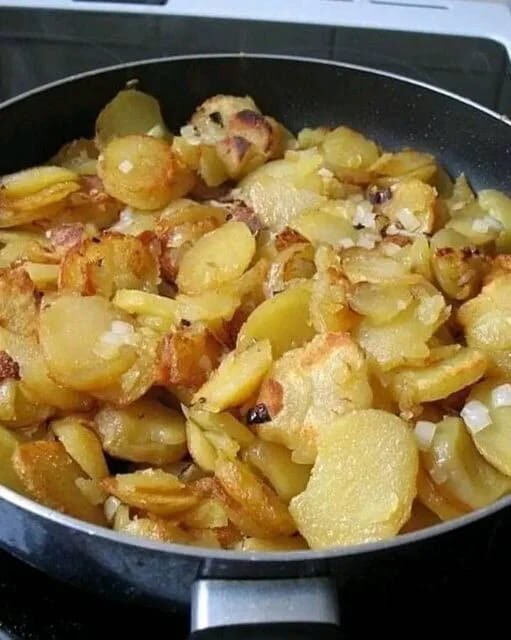Vegan Fried Potatoes and Onions:
Certainly! Here’s a description and approximate nutrient breakdown for Vegan Fried Potatoes and Onions:
Ingredients:
- 4 medium-sized potatoes, washed and thinly sliced
- 1 large onion, thinly sliced
- 2-3 tablespoons olive oil or any preferred oil
- Salt and pepper to taste
- Optional: Herbs or spices like paprika, garlic powder, or thyme for added flavor
Instructions:
- Prepare Potatoes and Onions:
- Thinly slice the potatoes and onions. Pat them dry with a paper towel to remove excess moisture, which helps in achieving crispiness while frying.
- Preheat the Skillet:
- Place a large skillet or frying pan over medium heat. Add the oil and allow it to heat up.
- Fry Potatoes and Onions:
- Once the oil is hot, add the sliced potatoes and onions to the skillet in an even layer.
- Let them cook without stirring for a few minutes to allow a golden crust to form on the bottom.
- Seasoning:
- Sprinkle salt, pepper, and any desired herbs or spices over the potatoes and onions.
- Gently toss or flip them to ensure even cooking and distribution of the seasoning.
- Continue Cooking:
- Cook the potatoes and onions for about 15-20 minutes, occasionally flipping or stirring them gently to prevent sticking and to cook them evenly.
- Adjust the heat as needed to avoid burning while ensuring they become golden and crispy.
- Test for Doneness:
- Check for doneness by inserting a fork into the potatoes; they should be tender inside and crispy outside.
- Serve:
- Once cooked to your desired level of crispiness and tenderness, transfer the Vegan Fried Potatoes and Onions to a plate lined with a paper towel to absorb any excess oil.
- Serve hot as a delightful side dish or as a main course with your favorite vegan sauces or condiments.
- Approximate Nutritional Information per Serving:
- The nutritional content can vary based on factors like the amount of oil used and portion sizes. Here’s an approximate breakdown for a typical serving:
- Calories: Around 200-250 calories per serving
- Total Fat: Approximately 8-12 grams
- Saturated Fat: Roughly 1-2 grams
- Sodium: Around 5-10 milligrams
- Total Carbohydrates: Approximately 30-35 grams
- Dietary Fiber: Roughly 4-6 grams
- Sugars: Around 2-4 grams
- Protein: Approximately 4-6 grams
Gut Health:
Plant-based diets are often associated with improved gut health due to the high fiber content from fruits, vegetables, and whole grains. A healthy gut microbiome is linked to better digestion and overall well-being.
Anti-Inflammatory Properties:
Many plant-based foods have anti-inflammatory properties, which can help in reducing inflammation in the body. Chronic inflammation is associated with various health issues, and a vegan diet may contribute to its prevention.
Sports Performance:
Contrary to the misconception that vegan diets lack protein, many successful athletes follow plant-based diets to enhance their performance. Plant-based proteins can support muscle building and recovery.
Reduced Risk of Foodborne Illnesses:
Plant-based diets eliminate the risk of foodborne illnesses associated with the consumption of undercooked or contaminated animal products.
Economic Impact:
A vegan diet can be more economical as plant-based protein sources tend to be cost-effective compared to some animal products. It may be a budget-friendly option for individuals or families.
Mindful Eating:
Adopting a vegan lifestyle often promotes mindful eating. Being more conscious of food choices and sources can lead to a healthier relationship with food and a greater appreciation for the environmental impact of dietary decisions.
Preservation of Biodiversity:
The expansion of animal agriculture often leads to habitat destruction and loss of biodiversity. Choosing a vegan diet supports the preservation of ecosystems and the protection of various species.
Culinary Diversity:
Veganism introduces individuals to a diverse range of cuisines and ingredients from around the world. Exploring plant-based cooking can be a culinary adventure, embracing flavors and techniques from different cultures.
Reduced Antibiotic Resistance:
The use of antibiotics in animal farming contributes to the rise of antibiotic-resistant bacteria. Opting for a vegan diet can be a way to reduce the demand for such practices and promote responsible antibiotic use.
Cruelty-Free Beauty and Personal Care:
Veganism extends to beauty and personal care products. Choosing cruelty-free, vegan alternatives ensures that your lifestyle aligns with ethical choices beyond just dietary preferences.
